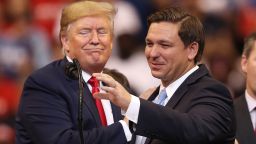Gov. Ron DeSantis, Florida’s hard-charging Republican leader who became a household name during the pandemic, will win a second term leading the Sunshine State, CNN projects, a development that will almost immediately turn the focus of his future to 2024.
“We not only won election, we have rewritten the political map,” DeSantis said in a speech Tuesday evening, after thwarting Democrat Charlie Crist’s attempt to take back his old job.
The governor called his reelection a “win for the ages” and validation of his aggressively partisan agenda. “We made promises to the people of Florida and we have delivered on those promises,” DeSantis said. “Today after four years the people have delivered their verdict. Freedom is here to stay.”
Florida, he charged, “was a refuge of sanity when the world went mad,” “where woke goes to die,” and “a ray of hope that better days still lie ahead.”
With the campaign for reelection behind him, a decision is looming about whether to ride his political success in Florida into a national campaign for the White House – one that could put him on a collision course with former President Donald Trump.
Even before Tuesday, the cold war between DeSantis and Trump was already heating up, overshadowing the final days of the campaign. Their long-simmering rivalry was on full display during the closing weekend of the midterm cycle when the two held dueling rallies on opposite sides of Florida, with Trump’s camp telling CNN his one-time ally wasn’t invited while DeSantis allies insisted the governor didn’t want to be there anyway.
On Saturday in Pennsylvania, Trump tossed out the nickname “Ron DeSanctimonious” – a sure signal the former president is actively considering how best to neutralize DeSantis in a potential primary showdown.
DeSantis has largely avoided talk about his presidential future – and Trump – though his actions suggest he is laying the groundwork for a run. He has built a fundraising machine that hauled in $200 million over the past two years, shattering national records for a gubernatorial candidate.
On the campaign trail, DeSantis spent little time on Crist, instead focusing on President Joe Biden and his nationalized political battles. His campaign released a series of compelling, sharply produced videos and ads geared as much toward his growing national following on social media and email as Florida voters. In one labeled “Top Gov,” DeSantis, who served as a Navy lawyer, cosplayed as a fighter pilot as he shared his “rules of engagement” for “dogfighting” with the “corporate media.” In another, his wife Casey DeSantis delivered an emotional account of her battle with breast cancer. His final ad suggested God created DeSantis to be a fighter.
In a test of his political appeal outside Florida, DeSantis spent the fall stumping for Republican candidates in battlegrounds across the country, at times landing in cities where Trump had also rallied voters. At these events, DeSantis consistently attracted crowds that surpassed any GOP figure this year not named Trump. DeSantis in the final weeks also made a series of endorsements in key races, including for the GOP nominee for US Senate in Colorado, Joe O’Dea, who had said he wouldn’t back Trump in 2024.
“A BIG MISTAKE!” Trump wrote in response to the endorsement on his Truth Social platform last month.
Election night brought far more certainty for DeSantis than it did four years ago, when the Republican was forced to wait for returns. He went on to a win in a recount over Democrat Andrew Gillum in what was the closest race for governor in state history.
That outcome would turn out to be consequential for Florida – and for DeSantis. In his first four years, DeSantis pushed through a divisive agenda that included new restrictions on abortion, a massive expansion of school vouchers for private schools, laws to reshape how schools teach and talk about LGBTQ topics and racism, and a ban on coronavirus vaccination requirements. He orchestrated flights that carried migrants from Texas to Martha’s Vineyard, refused to help the federal government distribute Covid-19 vaccines for children and pushed through an aggressively partisan redrawing of the state’s congressional boundaries that split up a sitting Black Democrat’s district.
His actions often put him at odds with the Biden administration, but they repeatedly thrust him into the national spotlight, turning him into one of the GOP’s most recognizable elected officials and leading to steady demand from conservative media.
DeSantis on Tuesday singled out two counties that appeared to flip from blue to red, the heavily Latino Miami-Dade and the Democratic stronghold Palm Beach.
“I am honored to have earned your trust and your support,” he said.
En route to his victory, DeSantis built an unprecedented cash advantage over Crist and his $31 million campaign. Half of the $200 million DeSantis raised came from donations of $50,000 or more, though he also received tens of thousands of small contributions from across the country. As of November 3, DeSantis had $66 million unused between his two political committees. Sources close to the governor’s team previously told CNN that DeSantis’ political operation had explored how to leverage leftover campaign money for a federal race.
Crist struggled to gain traction after winning the primary against state Agriculture Commissioner Nikki Fried in late August. His campaign was further hampered by the September arrival of Hurricane Ian, which brought the race to a screeching halt and postponed a planned rally and fundraiser with Biden and the race’s only scheduled debate. Biden did Crist no favors when he complimented DeSantis’ handling of Ian during a joint appearance in Fort Myers Beach.
Crist attempted to make DeSantis’ known political aspirations into an issue in the race. During their only debate, Crist challenged DeSantis to vow to serve a full four-year term if reelected as governor. DeSantis declined. In a canned line he appeared to read off a paper, DeSantis said of his future political ambitions: “The only worn-out, old donkey I’m looking to put out to pasture is Charlie Crist.”
In a second term, DeSantis has promised to eliminate permits to carry firearms and further “expand pro-life protections,” though he has not outlined what those might be.
DeSantis was first elected to the US House in 2012. He was reelected twice, though he resigned his third term early after securing the Republican nomination for governor in 2018. DeSantis defeated a more establishment-backed candidate in that primary on the back of an endorsement from Trump.
This story has been updated with additional information Tuesday.







